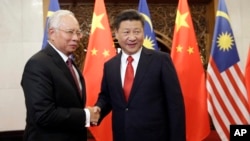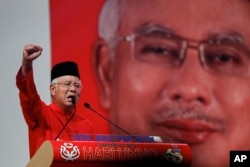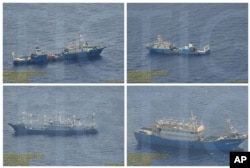A recent upbeat meeting between the leaders of China and Malaysia showcased extended bilateral cooperation despite their maritime sovereignty dispute in the South China Sea.
Analysts say last week’s trip by Malaysian Prime Minister Najib Razak to Beijing only underscored a long-standing deal by which Beijing offers economic support in exchange for the other side keeping quiet when angered by Chinese vessels in nearby waters.
Leaders in Beijing hope this understanding with the country that has the most extensive fossil fuel claims in the contested South China Sea will apply someday to other governments. Brunei, Taiwan, Vietnam and the Philippines claim all or parts of the sea, as well.
Regional order
“Certainly some scholars have taken the view that what China wants is a sort of regional order,” said Douglas Guilfoyle, associate international law professor at Monash University in Australia.
That means “essentially a set of rules that say we get to set the kind of broad policy for management of certain regional issues and everyone should defer to us, not simply because we’re the most powerful but because we are by our own lights well-intentioned and there will be mutual benefits for everyone because we’re a flourishing economy,” he said.
The Malaysian leader met Chinese President Xi Jinping in Beijing Thursday. The two leaders agreed during Najib’s six-day China visit to oppose “intervention” in the sea dispute, according to news reports from Beijing. The two countries also pledged stability at sea and called for freedom of navigation crucial.
Trade ties
China and Malaysia used the visit to sign 14 deals worth a combined 144 billion ringgit ($34 billion), according to Malaysian media. According to one deal, China will sell navy vessels to the other side.
Those deals made Najib’s visit popular among Malaysians, particularly the ethnic Chinese who are 21 percent of the population, analysts in Kuala Lumpur say.
“They see China as an opportunity for economic expansion, so the baseline for the relationship toward China is a positive one,” said Ibrahim Suffain, director of the Kuala Lumpur-based Merdeka Center for Opinion Research. “The local media here talks about many deals, so that’s pretty significant in terms of investment potential.”
China was already Malaysia’s top trading partner and chief source of direct foreign investment. Last year state-owned China General Nuclear Power Corp. bought the Malaysian development firm 1MDB’s energy assets in another company for $2.4 billion and China Railway Construction Corp. acquired a stake in the Malaysian property development project Bandar Malaysia.
In March, 100 Chinese vessels passed near Luconia Shoals, which Malaysia claims, but the country’s defense minister played it down instead of criticizing China.
Malaysia diplomacy
China will still probably avoid any military enforcement of its claims near Malaysia at the risk of nudging it toward the United States, analysts say.
U.S.-Malaysia security cooperation includes “numerous” military exercises, ship visits and educational exchanges, according to a 2015 Congressional Research Service document, although Malaysia “has assumed a relatively low profile” in the South China Sea dispute.
“It’s very obvious that Malaysia wants to play on both sides of the fence,” said Jonathan Bogais, associate political science professor at University of Sydney. “And that is working very well for them at the moment and it will keep working this way.”
China's claims on the SCS
But Beijing has irritated other governments with claims to the South China Sea by passing vessels through their exclusive economic zones of 200 nautical miles (370 km) off their coastline and reclaiming land to expand disputed islets for its own use. The sea is valued for fishing, marine shipping and the exploration for fossil fuels.
Beijing claims about 95 percent of the 3.5 million-square-kilometer (1.4 million-square-mile) body of water stretching from Taiwan to Singapore. It backs those claims with historic records.
Washington has helped Vietnam resist China by lifting an arms sales ban and does joint military exercises with the Philippines. China accuses the U.S. government of helping other maritime claimants to keep Chinese expansion in check.
Vietnam complains loudly when China approaches its sea claims and a Chinese oil rig sparked deadly anti-China protests in 2014 near Ho Chi Minh City.
Philippine President Rodrigo Duterte has taken a strong pro-China stance since October, winning aid pledges from Beijing in exchange, but has not officially cut off U.S. military preparedness aid in place since 2014. His predecessor took China to the world arbitration court and won the case July 12.






